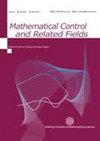有界区域上延迟五阶kdv型方程的镇定结果
IF 0.9
4区 数学
Q1 MATHEMATICS
引用次数: 12
摘要
本文研究的是具有时滞内反馈的五阶Korteweg-de Vries型方程Kawahara方程。在适当的时滞系数假设下,证明了该系统的解是指数稳定的。首先,考虑一个阻尼和延迟系统,在域的空间长度有一定限制的情况下,证明了Kawahara系统在$T>T_{\min}$时是指数稳定的。然后,引入一个更一般的延迟系统,并通过引入合适的能量,我们使用Lyapunov方法证明,考虑到初始数据小和域空间长度的限制,Kawahara方程的能量指数趋近于零。为了消除这些假设,我们利用紧性-唯一性论证简化了问题,证明了一个可观测不等式,得到了一个半全局稳定的结果。本文章由计算机程序翻译,如有差异,请以英文原文为准。
Stabilization results for delayed fifth-order KdV-type equation in a bounded domain
Studied here is the Kawahara equation, a fifth order Korteweg-de Vries type equation, with time-delayed internal feedback. Under suitable assumptions on the time delay coefficients we prove that solutions of this system are exponentially stable. First, considering a damping and delayed system, with some restriction of the spatial length of the domain, we prove that the Kawahara system is exponentially stable for $T>T_{\min}$. After that, introducing a more general delayed system, and by introducing suitable energies, we show using Lyapunov approach, that the energy of the Kawahara equation goes to zero exponentially, considering the initial data small and a restriction in the spatial length of the domain. To remove these hypotheses, we use the compactness-uniqueness argument which reduces our problem to prove an observability inequality, showing a semi-global stabilization result.
求助全文
通过发布文献求助,成功后即可免费获取论文全文。
去求助
来源期刊

Mathematical Control and Related Fields
MATHEMATICS, APPLIED-MATHEMATICS
CiteScore
2.50
自引率
8.30%
发文量
67
期刊介绍:
MCRF aims to publish original research as well as expository papers on mathematical control theory and related fields. The goal is to provide a complete and reliable source of mathematical methods and results in this field. The journal will also accept papers from some related fields such as differential equations, functional analysis, probability theory and stochastic analysis, inverse problems, optimization, numerical computation, mathematical finance, information theory, game theory, system theory, etc., provided that they have some intrinsic connections with control theory.
 求助内容:
求助内容: 应助结果提醒方式:
应助结果提醒方式:


